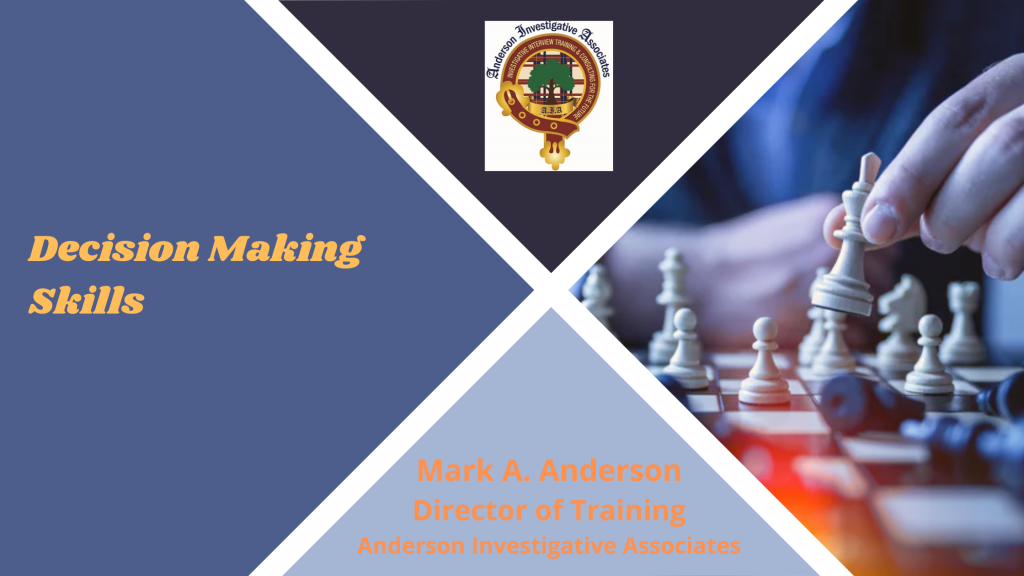
If you are in the business of doing interviews in investigations, audits, inspections, compliance, or the human resources arena decision making is a foundational part of your profession. However, the skill-set of well-thought-out decisions based on empirical evidence seems to be waning.
All too often we see decisions formulated based on political expediency and covering one’s own interest (appropriate way to say it), not based on mission, responsibilities, or ethics. I abhor those made on the first and applaud those made on the latter. We must be good decision makers.
Are you good at making decisions? The skill is natural for some people while others struggle to make even the most basic decisions. While personality types can play a role in one’s ability to make decisions, good technique can minimize that impact. It’s also a skill that can be learned and developed with practice and experience. Remember, mission dictates it.
One reason people don’t like to make decisions is they don’t want to be held responsible for the outcomes. This reluctance is a defense mechanism as others may criticize you if you don’t choose wisely. It could erode the confidence others have in you regarding your ability to make decisions. However, you can take steps to reduce this from happening. Unfortunately, there are plenty of leaders (really managers) that illustrate this fear. The fear cripples them from fully embracing their leadership responsibilities.
One of the main factors in decision making is confidence. Therefore, building confidence will help you make decisions. Others will also follow your lead as they will respect your confidence. When you make decisions with confidence, they have no choice but to recognize your authority, an authority based on ability, not title.
As we talk in our interview training all the time, the number one reason interviewees tell us the truth is because of the confidence and credibility of the interviewer. Please don’t misunderstand what I said, it was confidence, not arrogance. Now we know that confidence will aid us in the interview but will also be valuable when it comes to making decisions.
Decision making requires finding out the right information. You won’t get far if you start making decisions without information to back them. You need to be informed when making your decisions which means you have some inquiry to conduct. You must get as many of the facts as you can before making most decisions.
Often, you won’t get all the facts you need for one reason or another. In this case, you will need to take a leap of faith and rely on your confidence and experience when making decisions. That’s an unfortunate part of the process and one that makes people choose wrong directions sometimes. But, if you decide using the information you have available, you can defend your choice.
As part of the decision-making process, consider coming up with alternatives. List out all possible alternatives based on the current information. You can rate the alternatives on a scale of your choosing. This rating can help you when making the decision. You can choose a star-rating system or a percentage system (0-100), etc. This can be very useful in quantifying your results to examine them objectively.
Another technique people like to use is to list out the pros and the cons. To do this, take out a blank piece of paper and draw a dividing line in the center. Create the heading “Pros” on the left, and “Cons” on the right. Then, list out the pros and the cons. You can use this to guide you with your decision. Try not to make this process too mechanical as the list may contain several subjective items and your experience needs to be factored in.
As with most things I teach in our interview training programs, the more we can make this process habitual, to be used in every decision, the more our confidence builds in making quality decisions. This process should be used in planning investigations and audits, determining order of interviews, how to approach a singular interview, what themes to employ, how to maximize rapport. The list should go on and on and I am sure with your experience you have come up with others. Once we start using this approach consistently, additional points of application will become apparent.
Having used this approach for several years, I use this multiple times a day. I used it just prior to writing this in rounding out a scheduled day of training at a national conference. I have four blocks of instruction, what am I going to teach. In this case, I did the ranking system first, then a pro/con system on the blocks I chose. This is all part of planning, and planning is essential for our success.
Anderson Investigative Associates is positioned to custom-tailor training to your specific needs. If you have any questions or would like to discuss the above issues of making better decisions or any training need, please reach out. Additional issues pertaining to interviewing, auditing, and investigations can be found in other blogs and videos that I have produced and are contained in most blocks of instruction that our company presents.
If you have additional questions, comments, or have an interviewing topic you would like me to address, give me a shout. In the meantime, be well, stay safe out there, and start making quality decisions.
Mark A. Anderson
Director of Training and Development
Anderson Investigative Associates, llc
114 Loucks Avenue
Scottdale, PA 15683
manderson@andersoninvestigative.com
tel:912-571-6686
www.AndersonInvestigative.comhttps://www.linkedin.com/in/mark-a-anderson-a46a1658
